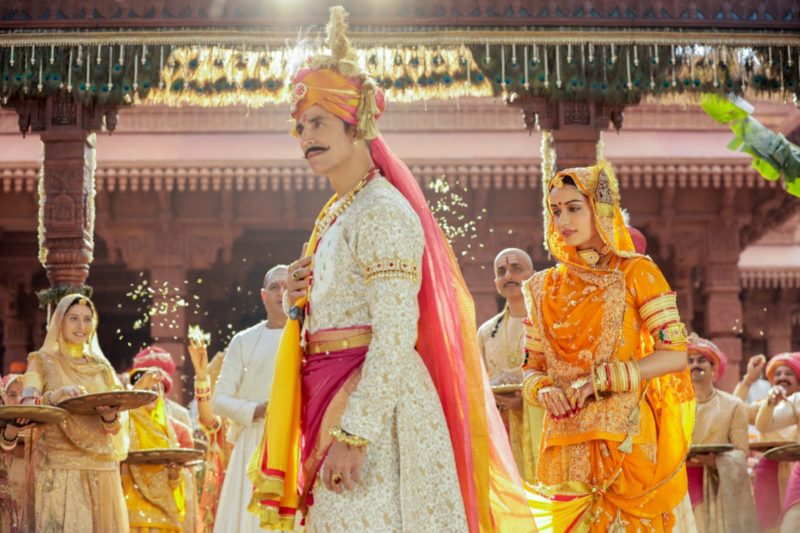Shankar – Ehsaan – Loy composing for a period film was something a lot of their fans would have been looking forward to for years. Shankar Mahadevan, after all, is known to be somebody who has studied Indian classical music extensively. His composer partners Ehsaan Noorani and Loy Mendonsa would have also brought in tremendous value to such a project despite them being more familiar with Western music.
For some reason, the trio never did a Hindi film that is set in a bygone era and one which necessitates the creation of a soundtrack that is steeped in Indian melody. The trio did compose half of the songs for the Marathi language film ‘Katyar Kaljat Ghusali’ (2015) which was set in the British era but didn’t get to work on such a project in the Hindi film industry. Yash Raj Films’ historical drama ‘Prithviraj’ is their first outing in this space and one has multiple reasons to expect good music from this film which sees the trio teaming up with lyricist Varun Grover for the first time.
The album opens with “Hari Har”, a robust track sung with gusto by Adarsh Shinde who has primarily sung for Marathi films. The war-cry like song is everything you expect it to be. It has an infectious energy and would fill the hearts of those, who have read about Prithviraj Chauhan extensively, with a sense of pride. Shankar – Ehsaan – Loy create a fairly engaging tune and layer it with the kind of orchestration that befits its scale. The highlight of the song, however, are the lines written by Varun Grover.
“Hadd Kar De” which, arguably, is the most tuneful song on the album, arrives next. Shankar – Ehsaan – Loy’s composition is highly addictive and the hookline (“hadd kar de piya hadd kar de, har sarhad ko radd kar de”) stays in your mind as soon as you hear it for the first time. The overall sound of the song is slightly similar to the Pritam composed “Rajvaadi Odhni” from ‘Kalank’. The two songs, however, are very different from each other. “Honth ki laali kaanch ki pyaali pe aisi saaje, jaise mera ik mantar tere andar baaje” – Varun Grover writes the kind of lines that complement the tune very well. The lyrics, apart from being skilfully written, have the kind of ‘sound’ that works very well for the song. Neeti Mohan, who has sung songs in a similar space like “Nainowale Ne” (‘Padmaavat’), does well as a vocalist.
Though “Makhmali” has been designed as an Indian melody, there are some modern elements to it. Because of the presence of these elements, this song could also have used in a contemporary film. The composition is simple and pleasant and the track benefits hugely from Shreya Ghoshal and Arijit Singh’s rendition. Shreya, in particular, lends a certain tenderness to the song which works wonderfully for the situation (Sanyogita getting married to Prithviraj Chauhan) the song is set against. A Rajasthani folk rendition by Keerthi Sagathia, which can be heard at the 2:07 mark, serves as a gentle reminder of the milieu of the song. Varun Grover impresses again with his lyrics.
Sunidhi Chauhan takes centre stage in “Yoddha”, a song which has been designed to depict a situation in which Sanyogita is forced to take up arms and fight a battle. The tune is pretty ordinary. The antara, however, is slightly more engaging than the mukhda. The elaborate orchestral setup helps you stay invested in the song. Sunidhi sings the song with the required energy and passion but the laidback manner in which she pronounces a few words (“keh gaye” is pronounced as “kay gaye”) is bothersome.
The remaining three tracks on the album are the ones that have been used as background pieces in the film. “Aigiri Nandini”, the devotional number composed by Alap Desai, boasts of rich orchestration and a pulsating rhythm and should work very well with the visuals. Sanchit Balhara and Ankit Balhara, who have put together the background score of the film, are credited for “Prithviraj Theme” and “Sanyogita’s Theme”. While the former sounds very generic, the latter makes an impression largely due to the sargam rendered by Manya Narang.
Given the fact that ‘Prithviraj’ is the first historical film (Hindi) which Shankar – Ehsaan – Loy have worked on, one had gigantic expectations from the soundtrack. While the album doesn’t really live up to those expectations, it is still one of the better Bollywood soundtracks one has come across in the recent past.

